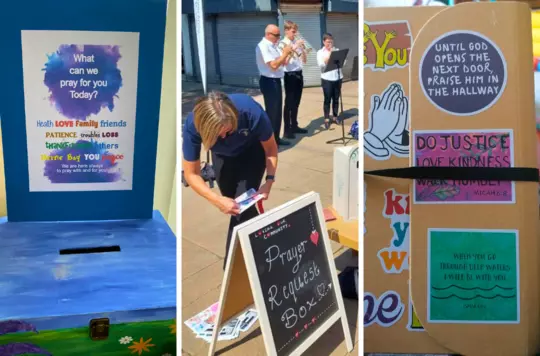13 September 2025
Matthew 6: When you pray
Major Gordon Cotterill
Major Gordon Cotterill challenges us to discover true inner transformation.
Key texts
What an irritating prayer the Lord’s Prayer is! Right at the heart of the Sermon on the Mount – or what theologian Dallas Willard calls a ‘curriculum for Christlikeness’ – we find a way of praying that refuses to tolerate superficiality, encourages a depth of relationship with God, and invites us into ongoing transformation. Here is a prayer to get under your skin, to confront and challenge anything that displaces God from his rightful place.
This prayer is not comfortable – it’s not meant to be. It’s meant to realign us with the heart of God. If we don’t allow it to irritate us, this prayer that was introduced to us as children and recited by rote can easily be reduced to something we digest without reflection. We could find ourselves spending time lamenting the absence of the word ‘trespasses’ and miss the revolutionary invitation to forgive, the transformative call to be shaped by the availability of the Kingdom, the bold summons of surrender, and the profound challenge of dependence.
Pause and reflect
- What does it mean for a prayer to ‘get under your skin’ in a spiritually healthy way?
- How might the Lord’s Prayer be inviting you into deeper relationship, trust or surrender?
What is the likelihood it wasn’t just the disciples who heard Jesus’ teaching on how to pray? When Jesus saw the crowds in Matthew 5:1 and 2, he went up on a mountainside and began to teach. While the passage doesn’t explicitly mention who was present, it’s likely more than just his closest followers were listening.
Pharisees and scribes often followed Jesus as observers and critics. It’s possible some of them were in the crowd or at least heard about his teachings later. Either way, the message was public, and its reach extended far beyond the inner circle.
The leaders of the Pharisees and scribes would have been irritated to hear that God values sincerity over spectacle, that true prayer happens in private and we don’t need to impress God with words. This is the kind of praying that would have got under the skin of anyone for whom relationship with God was merely about controlling outward behaviour rather than pursuing true inner transformation.
Pause and reflect
- How does the Lord’s Prayer challenge tendencies you have towards outward displays without inward transformation?
- Which part of the Lord’s Prayer feels most uncomfortable or confronting?
Having set the scene, Jesus says: ‘This, then, is how you should pray’ (v9). In a 2016 call to prayer for Thy Kingdom Come, former Archbishop of Canterbury Justin Welby described this prayer as: ‘Famous enough to be spoken each day by billions in thousands of languages… It’s simple enough to be memorised by small children and yet profound enough to sustain a whole lifetime of prayer.’
Theologian Søren Kierkegaard once wrote: ‘The function of prayer is not to influence God, but rather to change the nature of the one who prays.’
The Lord’s Prayer, when prayed and digested, has the potential to transform us each day, presenting a way of living and understanding that ensures we know what it is to be one with God. The values embedded in it reflect a radically different way of being, one rooted in service, love, surrender and trust. They invite us to live in the reality of God’s Kingdom, not the illusions of power or self-sufficiency. They draw us into a life not shaped by the world’s default settings of ego, vengeance and domination but the way of Jesus.
To pray ‘our Father’ is to step into an intimate and awe-inspiring relationship with God. It invites us to see God not as distant, but as holy and present in the everyday, to live as his beloved children. ‘Hallowed be your name’ are not just words of reverence. We are asking for our lives to reflect God’s beauty and holiness in a world that often celebrates self-promotion over sacredness.
Pause and reflect
- In what ways are you living as a beloved child in God’s presence?
- Where might you be invited to honour God more deeply in your daily choices?
To pray ‘Thy Kingdom come, thy will be done’ is a radical reorientation. Resisting the dominant story of control, it opens to us the availability of God’s Kingdom here and now. We are invited to participate in something bigger than ourselves, a divine movement of justice, mercy and peace. Our surrender to God’s will is a courageous act of trust, reshaping how we relate, work and rest.
It asks us to depend daily on God’s provision for the sustenance of our whole being.
Pause and reflect
- How are you participating in the life God is making possible around you?
- Where are you resisting God’s will, and where are you surrendering to it?
To pray for forgiveness and guidance before recognising God’s glory calls us into revolutionary grace, both given and received. We ask for deliverance from anything that pulls us away from life with God. We remember this is not our story to control. It is God’s Kingdom, God’s power and God’s glory. Our task is to live in that story, faithfully, humbly and with open hands.
Pause and reflect
- Who do you need to forgive?
- Who might you need to ask for forgiveness from?
- Are you living as if this is God’s story, not yours?
The Lord’s Prayer is a bold, disruptive invitation into a life shaped by the values of God’s Kingdom. It challenges assumptions, confronts egos and calls us into deeper oneness with God. If we let it, it can quietly get under our skin!
Bible study by

Major Gordon Cotterill
Secretary for Spiritual Life Development, THQ
Discover more

This bite-sized Open Learning course introduces you to the prayer that Jesus taught his disciples to say in Luke 11:1–4.

Lyn Woods explores how corps and centres across the territory are getting creative with prayer and seeing results.

Captain Gary Lacey explains why we should change the way we think about prayer.

